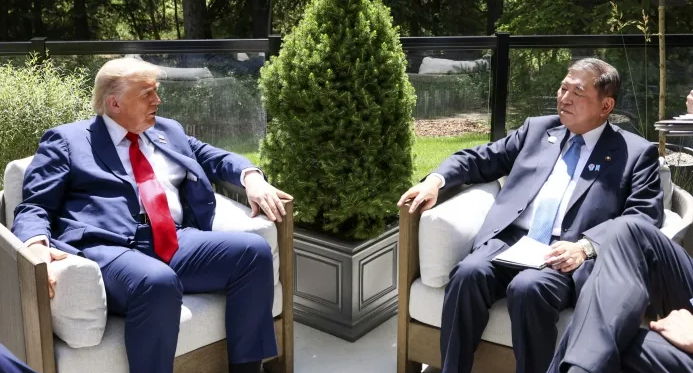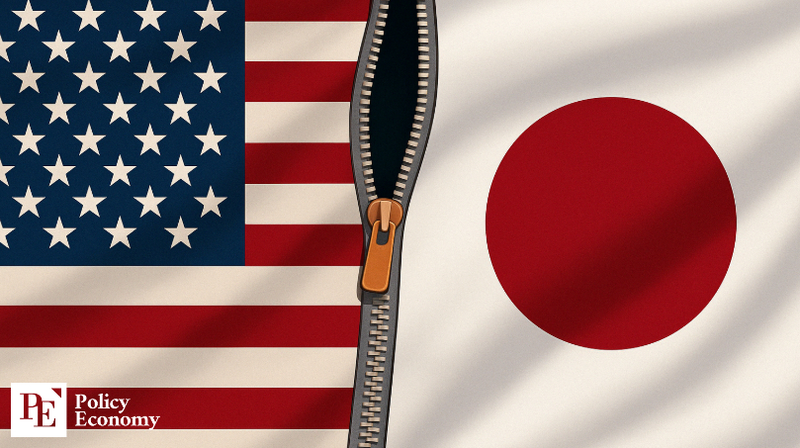Trump Pressures Japan with 35% Tariff Threat: “Tariff Negotiation Brinkmanship”
Input
Modified
Trump: “No Consideration for Tariff Suspension or Extension” Repeatedly Targets Japan: “May Impose 30–35% Tariffs” Pushes for Deal as Tariff Suspension Nears Expiry

U.S. President Donald Trump expressed a negative stance on the possibility of reaching a trade agreement with Japan, warning that he could raise reciprocal tariff rates up to 35%. With the suspension period for reciprocal tariffs set to expire next week, he has shown growing dissatisfaction with stalled negotiations and has escalated pressure on Japan for the third consecutive day. Japan, which had organized a negotiation team early on, has yet to find common ground in the ongoing tariff discussions.
Trump Hints at Raising Japan’s Reciprocal Tariff Rate from 24% to 35%
On the 1st (local time), aboard Air Force One returning from a visit to Florida, President Trump commented on the upcoming expiration of the reciprocal tariff suspension on July 8, stating, “I’m not thinking about a pause,” and added, “I’ll be writing one-page or one-and-a-half-page letters to many countries (regarding tariff rates).”
The Trump administration has used the expiration date of the tariff suspension (July 8) as a deadline for conducting trade negotiations with various countries over tariff rates, trade balances, and non-tariff barriers. It has warned that countries showing a lack of engagement may receive unilateral notices outlining the imposed tariff rates.
Regarding Japan in particular, President Trump dismissed the possibility of reaching a deal, saying he is “skeptical about the chances.” While stating, “I love Japan, and the late Prime Minister Shinzo Abe was one of my closest friends. I also like their new prime minister,” he criticized Japan for “being very spoiled after exploiting us for 30–40 years along with others.” He emphasized, “We are running a serious trade deficit with Japan, and as a result, we will impose tariffs of 30–35% or any rate we decide.” This figure is significantly higher than the 24% reciprocal tariff considered for Japan in April.
“Why Won’t They Import Our Rice?” Trump Threatens Tariff Retaliation
On June 30, President Trump also raised the issue of Japan not opening its rice market and threatened to send a unilateral tariff letter. On his social media platform Truth Social, he wrote, “I respect Japan very much, but even though they are experiencing a severe rice shortage, they refuse to import our rice,” adding, “I will send them a letter.” Despite multiple rounds of negotiations, he criticized Japan’s insufficient imports of U.S. rice and threatened to impose arbitrary tariffs.
Although Japan’s rice prices have nearly doubled compared to last year, the country continues to minimize imports to protect its domestic market. The ruling Liberal Democratic Party's traditional support base includes farmers, and Japan has resisted opening its rice market under the pretext of “food security.” According to Reuters, Japanese Economic Revitalization Minister Ryosei Akazawa said on July 1, in response to Trump’s tariff threats, “We will not engage in negotiations that sacrifice agriculture.”

Japan’s Auto Industry Faces $23 Billion Loss if Tariff Talks Fail
Furthermore, during a Fox News interview on June 30, President Trump expressed dissatisfaction with Japan’s refusal to import U.S. automobiles and stated, “Hear me, Japan. You will be paying a 25% tariff on Japanese cars exported to the U.S.” This move is seen as an attempt to use Japan’s “non-tariff barriers” as justification to demand the elimination of policies and practices that disadvantage U.S. goods. Analysts interpret the pressure on rice imports as a strategic move to extract greater concessions in other sectors such as automobiles.
These comments came less than a week before the tariff suspension period ends. As trade talks between the U.S. and Japan remain stalled, Trump has increased pressure by threatening to directly notify tariff rates. Despite seven rounds of ministerial-level negotiations over several months, the two countries have failed to resolve their differences over tariff levels.
Currently, Japan is requesting exemption from Trump’s 25% automobile tariff, claiming it would cripple a core industry. Toyota, for instance, is projected to post a net profit of approximately $23.4 billion in the fiscal year ending March 2026, down 34.9% from the previous year. The decline is attributed to the high 25% tariff. Trump’s auto tariff policy is a central pledge from his re-election campaign, aimed at “reviving U.S. manufacturing” and “eliminating trade imbalances,” and has been aggressively implemented since he took office. The steep increase from the existing 2.5% to 25% specifically targets major auto-exporting countries like South Korea, Japan, and Germany.
This has dealt a heavy blow to Japan’s auto industry. Despite expanding production facilities in the U.S., Japanese automakers still export a substantial volume of vehicles manufactured in Japan to the U.S. Toyota, for example, produces many high-end and hybrid vehicles—including the Lexus line—domestically for export to the American market.
The Japanese government has repeatedly urged the U.S. to grant a tariff exemption. However, President Trump has been dismissive of such requests, arguing that while Japan barely imports U.S. cars, the U.S. imports millions of Japanese vehicles. Trade and foreign policy experts believe that unless Japan presents a new negotiation card that the Trump administration finds favorable by July 9, the U.S. is likely to unilaterally impose tariffs. As a result, the Japanese government is expected to begin broad-based coordination, potentially using key sensitive sectors like agriculture as leverage.





















